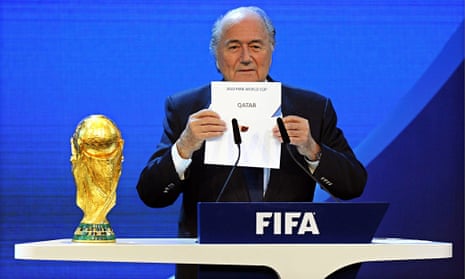Fifa’s well-remunerated secretary general Jérôme Valcke, very much at home in the expensive lobby of a five-star hotel in Buenos Aires during a key date in the IOC calendar, laid out in simple terms for a small gaggle of hacks just how things were going to be.
Above the babble of disingenuous, faux polite chatter that floats between the captains of sporting blazerdom on these occasions, he explained the Qatar World Cup would inevitably be moved to winter, most likely late November.
Relations with professional leagues and clubs in Europe would be smoothed, he said, recalling how he had only recently dined with the Premier League chief executive, Richard Scudamore, a longtime acquaintance, at an Italian restaurant in Zurich. Meanwhile he would personally ensure that Fifa’s broadcasters and sponsors – the organisations that grease the wheels of the Fifa bandwagon to the tune of $1bn a year – were squared off. As a parting shot, he playfully scolded: “Compensation is a word you should never, never use.”
That was in September 2013. The very same week the Fifa president, Sepp Blatter, made his own feelings clear. “After many discussions, deliberations and critical review of the entire matter, I came to the conclusion that playing the World Cup in the heat of Qatar’s summer was simply not a responsible thing to do,” he explained in an odd interview with Inside World Football, which read more like a legal argument than his usual jumble of non-sequiturs.
So the idea that Fifa’s grandly titled taskforce would come to any other conclusion than a World Cup beginning in late November 2022 and concluding just before Christmas is laughable.
Valcke, Blatter’s longtime fixer and a crucial cog in the Fifa machine, was instrumental in the low-key announcement a fortnight ago that Fox and Telemundo had been handed the US broadcasting rights to the 2026 World Cup without a tender. The decision angered rival US broadcasters but was a vital precursor to Tuesday’s announcement given that Fox in particular had been one of the most vocal and active opponents of a winter switch for 2022. It would be a surprise if they were quite so vocal now.
It was Valcke, incidentally, who in 2011 claimed the Qataris “bought” the World Cup in an embarrassing private email - insisting he was referring to their lavish marketing spend when it was made public. And it was Valcke who admitted responsiblity for the dual World Cup race in the first place - the root cause of the chaos that followed - claiming he was keen to maximise commercial returns in the face of a looming recession. The fact it also gave Blatter more scope for politicking ahead of a Fifa presidential campaign went unsaid. As so often, the taskforce process has been little more than a fig leaf designed to smooth the path to a pre-ordained outcome. Or, sometimes, to keep Blatter’s options open while he decides how the dice should best fall for his own gain. In making that calibration, it matters little whether Blatter completely contradicts himself amid the screech of endless U-turns. For evidence that echoes down his 40 years at Fifa, see his luddite determination not to introduce goalline technology into enthusiastic backing for video replays. Or his promise to stand down in 2015 miraculously segue into the realisation his “mission” is unfinished.
Although the first rumblings about switching the tournament to winter were heard in the immediate aftermath of the Wizard Of Oz-style unveiling of Russia and Qatar as World Cup hosts to gasps and grumbles in December 2010, most notably from Franz Beckenbauer and Michel Platini, Fifa itself was circumspect to begin with.
“The invitation to tender was to play this [2022] World Cup in June, and that’s how it was done,” said Valcke after the vote. A few months later Blatter said: “The basic conditions – not just for Qatar but for all the candidates – were the same. It means the Fifa World Cup is played in June and July.”
As usual, Fifa was basically making up the rules as it goes along. Meanwhile, the Qatar 2022 Supreme Committee – submerged by allegations of collusion and vote buying – continue to insist it could host in temperatures of 50 degrees by employing air cooling technology.
Disquiet from the European leagues has not been wholly quelled, even if statements from the European Club Association and Association of European Professional Football Leagues largely reeked of compromise and retreat. The ECA chair Karl-Heinz Rummenigge is, after all, the same former German international who was in 2013 stopped in the “Nothing to declare” channel with two Rolexes worth £84,000 – a gift from an unnamed friend – on his way home from Doha.
Platini – the Uefa president who famously met with Nicolas Sarkozy and the Emir of Qatar before the World Cup vote and saw his son employed by an offshoot of Qatar Sports Investments but has always insisted the decision to vote for Qatar was his alone – said European football’s governing body could live with the switch to winter.
It was Scudamore, patently irritated at being dragged to Doha for a fait accompli, who sounded most like he wanted to carry on the fight. He has long been irritated by Fifa’s arrogance in voting on a summer World Cup and then assuming the rest of football will fall in line when it flip-flopped to winter. In its bid to repel Scudamore’s attack, Fifa will – among other tactics – fall back on the sense that the old European colonialists are attempting to dictate the future of the game to the rest of the world.
Why shouldn’t the sporting calendar be tweaked to allow the world’s game to expand to new areas? Who are the old European powers to say that their calendar is set in stone? The same old bitter English FA, mithering about their quaint Boxing Day traditions.
Yet this is a false argument. The debate is not whether a World Cup in the Middle East is a good idea – bid for, voted on and organised properly it probably is. Nor is it over whether considered changes to the sporting calendar to allow new parts of the world to bid for and host a World Cup or Olympics are a good idea – they probably are. Nor even whether the balance of power in world football should tip away slightly from the European and South American superpowers.
The issue at hand is whether Fifa – having presided over the most convoluted, controversial and cack-handed bidding process in the history of sport – should be allowed to get away with one more chaotic attempt to clear up a mess entirely of its own making.
It says much for the priorities of world football’s discredited governing body that so much effort has been put into ensuring the World Cup can remain in Qatar by turning the global sports calendar upside down and so little into a concerted effort to hold the authorities to promises on meaningful reform of their treatment of migrant labourers building the infrastructure to host the tournament.
So once again the arrogance, the caprice and the sheer chutzpah of Blatter has led to a scenario that will go on demanding huge amounts of time, energy and argument that could be much better expended elsewhere. Not least on considering a more pressing challenge – a World Cup in Russia that is three years away and presents no scheduling or climatic headaches but threatens many more besides.

